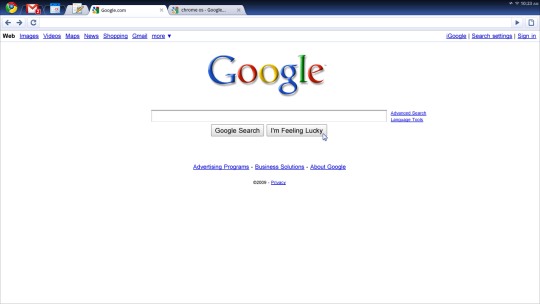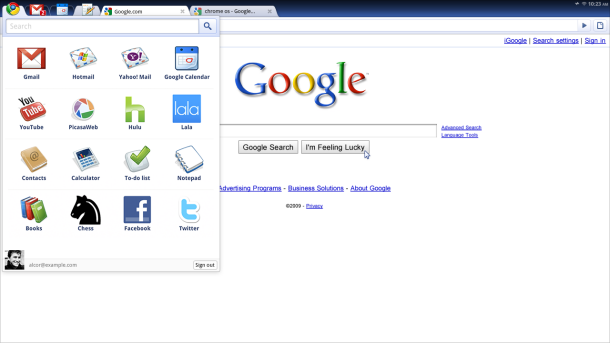Google Lifts the Curtain on Chrome OS
Google has finally revealed details about its highly anticipated netbook operating system, Chrome OS.
At a press event in California yesterday, Google gave details of its latest venture, this one representing the search giant's foray into the OS market. Based around web-based applications like Google Docs and Gmail, the Chrome OS is essentially a bulked up version of the Chrome browser already available from Google.
Given that it's pretty much just Chrome with more stuff, it's no surprise to see that the OS itself looks just like the Chrome browser, tabs and all. The group of tabs you see on the top left is actually a task bar, showing all the applications you've got running.
While it's all going to be a largely browser-based experience, you're not going to be stuck in the same window for every application, switching back and forth between writing up a document, chatting and watching videos. Some applications will have their own windows, similar to what you have with Gtalk. This is largely for smaller apps like the ones that allow you to listen to music or chat with friends. These panels are collapsible and will 'float above' your regular content. Finally, you'll also be able to have multiple windows, so you're not confined to just one window with a bevy of application tabs.
Alright, but what happens when you're not connected to the web? Can you still use your computer? The answer is yes. Google will be offering the capability to use some programs when there is no connection, similar to the way Gears allows you to use Google Docs and Gmail offline. But, even if you're working offline, remember all of your data is stored in the cloud, a set up that a lot of people have trouble trusting.
So, considering all apps are webapps, our first question was, "What are they going to do about security?" Our biggest concerns were viruses and nasty bits of malware, Google says having all apps live within the browser actually offers significant benefits when it comes to security. Caesar Sengupta, and Matt Papakipos (Group Product Manager and Engineering Director, respectively) explained that the Chrome OS doesn't trust the applications you run, so each app is contained within a security sandbox making it harder for malware and viruses to infect your computer. Furthermore, every time you restart your computer the operating system verifies the integrity of its code and if your system has been compromised, it's designed to fix itself with a reboot.
Check out the videos below, one of which is more of a "Chrome OS for dummies," and the other which actually shows how the Chrome OS will work.
[UPDATE] Have added the entire presentation in case you have nearly an hour and a half to spare. It is Friday . . .
Get Tom's Hardware's best news and in-depth reviews, straight to your inbox.

Jane McEntegart is a writer, editor, and marketing communications professional with 17 years of experience in the technology industry. She has written about a wide range of technology topics, including smartphones, tablets, and game consoles. Her articles have been published in Tom's Guide, Tom's Hardware, MobileSyrup, and Edge Up.
-
you know, i think this has potential and all, but there is no way so many people would change over from windows to make this truly successful.Reply
-
sublifer I'd like to know what its doing for file management... grabbing pics off a camera and putting them in picasa or whereever is one thing but what about if you want to keep it on the PC? I've had tons of ideas on file management and I just want to see if they're gonna stick to a simple file explorer or if they're going to make it an EXPERIENCE.Reply -
farrell4g It'll be interesting to see if it will catch on. It is free after all, and might not need the learning curve of linux.....Reply -
David the Gnome It seems like you should be able to run this on a system with very minimal specs. If nothing is really stored on the computer then you don't need more than a couple GB's of space on the computer. If you purpose built a machine to run on this OS you could probably have a fully functional computer for well under $100.Reply -
apache_lives (Inter)net-book simplicity - couldnt have made it any easier, the title explains it all, SIMPLE.Reply -
I’m not sure about storing confidential information (banks/account details etc) on Google servers; for sure it will get hacked. I think Google OS should have options to choose between storing data online or disk.Reply
The simplicity approach of Goggle Chrome Os is good and should have been implemented by major Linux distributors (RedHat, SUSE, Manadrake etc) many years ago.
They should change the name to: Google Ads Bombardier 2010
-
ytoledano Would be great if it could connect to a remote computer running Windows using RDP.Reply
Unlikely!



